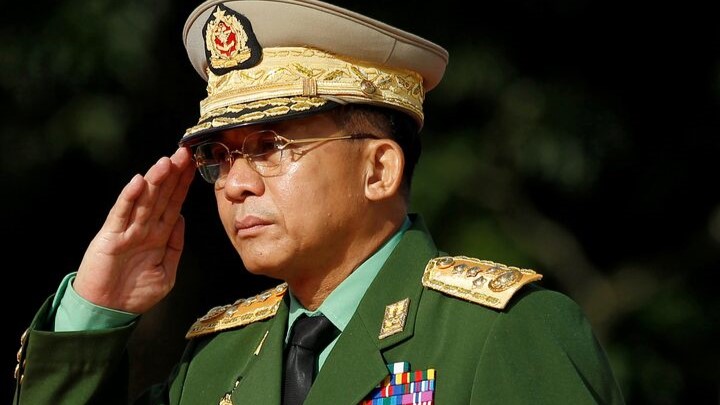top of page
Myanmar Coup and the Junta

BACKGROUND AND BUILD-UP
The Union of Myanmar, situated in South Asia, is currently under violent, chaotic military rule. The country, having a violent past filled with internal wars, military takeovers, and political changes, has struggled, frequently with little success, to achieve nation-building, democratic consolidation, and ethnic reconciliation since gaining independence from the British administration in 1948.
After years of progress toward democratic reforms, the military junta's recent coup d'état in 2021 has thrown Myanmar into instability once more and raised the possibility of the country's delicate social and political fabric coming apart. Myanmar's complicated political past and the military's long-standing political influence are the main contributors to the country's instability. Since Myanmar's independence, the military forces, known as the Tatmadaw, have dominated the political landscape of the nation.
The military coup of General Ne Win in 1962 created a one-party socialist state, establishing a precedent for military involvement in politics. The 2008 constitution, which was crafted with military oversight, guaranteed its enduring dominance by giving it the right to veto power over important ministry appointments and amendments to the constitution.
The Tatmadaw carried out a coup on February 1, 2021, right before a new parliament was about to meet in response to the NLD's overwhelming triumph in the 2020 elections, which saw the military’s proxy party, the Union Solidarity and Development Party (USDP), suffering a huge blow.
Alleging major voting fraud and other corruption cases, President Win Myint, de facto civilian leader Aung San Suu Kyi, and other civilian officials were held by Senior General Min Aung Hlaing. By imposing a state of emergency, the military essentially destroyed Myanmar's weak democratic institutions and ushered in a new period of authoritarian governance.
EVENTS UNFOLDED SINCE 2021
Following the coup as an aftermath of events, mass public outrage unfolded amid dictatorial military power. Both domestic and international condemnation was received in Myanmar from political parties, governments and leaders. At the same time, a failed public armed resistance emerged to counter General Min Aung Hlaing after the formation of a shadow government known as the National Unity Government. After that, the junta has squashed any public show of opinion.
September of the same year saw a “people’s defensive war” announced by elected members functioning from exile (The National Unity Government) to put up another round of resistance to the junta. However, this resistance fought back in a tit-for-tat manner, i.e., violence for violence, and further encouraged the establishment of around 250 resistance lobbies referred to as “People’s Defence Forces” (PDFs).
Most stood in support of the NUG, many stood for themselves, and others fell directly under the NUG’s command structure. By this time, the PDFs had acquired more sophisticated machinery, public support, and, most importantly, experience, yet lacked coordination and heavy weaponry.
OPERATION ‘1027’
Operation 1027 was launched in the northern region of Shan on 27 October 2023. The operation was undertaken by three allied forces in Myanmar, namely, the Myanmar National Democratic Alliance Army (MNDAA), the Ta’ang National Liberation Army (TNLA) and the Arakan Army, together with the Three Brotherhood Alliance (3BTA).
The 3BTA benefitted from various funding and support from the black market, foreign traders, and especially from the tax and customs duties received in the area of Myanmar under its control. The Myanmar Military witnessed some historical defeats of the same, eventually ending with a Chinese-mediated ceasefire on 11 January 2024.
Operation 1027 proved one of the most successful uprisings against the military. It effectively served as a slap to the junta fighters and their already-demolished morale due to the PDFs.
SUBSEQUENT OPERATIONS
Several consequential operations took place following Operation 1027 due to the significant morale boost of the public and anti-regime forces. By late May 2024, the Arakan Army gained control of ten strongholds, nine of which are in the Rakhine state and one in the next-door Chin state that borders India.
The Kachin Independence Organisation’s armed wing, the Kachin Independence Army, launched against the junta on 7 March, effectively gaining access to around 70 military outposts. On March 28, the Karen National Liberation Army seized control of Hpapun, a town deep in the Karen Hills that held substantial strategic importance as a vantage point for the regime.
Furthermore, the KNLA grabbed Myawaddy, a trading post on the Thailand border dealing with around $4 billion annually. Although these PDFs, anti-regime forces and other support groups fought with the narrative of defeating the oppressive military, many suspect that these forces fought for personal gain and territorial control. On the other hand, evidence surfaced that many of these anti-regime operations had been planned as coups before 2021.
CONSEQUENCES
The coup has impacted not just the nation’s international standings and diplomatic relations but has also severely affected the economic and humanitarian spheres worldwide. Myanmar is becoming more diplomatically isolated and facing sanctions from various countries. Furthermore, ASEAN’s “Five Point Consensus”, agreed to by Myanmar’s top leadership, also has not achieved peace. Economically, the impact is severe and goes beyond Myanmar's boundaries.
The energy sector, which accounts for more than 20% of the nation’s exports, is also struggling, with giants like Total Energy and Chevron exiting. A humanitarian crisis engulfs the region as well, particularly the neighbouring countries- Bangladesh, India, and Thailand, which are battling increased refugee inflows and unlawful border crossings. It is straining regional resources as tens of thousands of refugees are escaping to neighbouring countries, and roughly 3 million people are internally displaced. The living conditions of these refugees are abysmal, surviving on essentials.
The Myanmar issue calls into question the ability of the international community to maintain human rights, respect democratic values, and oversee regional stability, as peace is still elusive in the country. Ultimately, the Myanmar crisis is more than just a local problem; it impacts the world, and dealing with it requires global multi-layered cooperation.
In eloquent words, UN Secretary-General António Guterres said, "In Myanmar, we need sustained international and regional attention to help urgently forge a path towards a democratic transition and return to civilian rule."
BY TEAM GEOSTRATA
bottom of page
.png)















